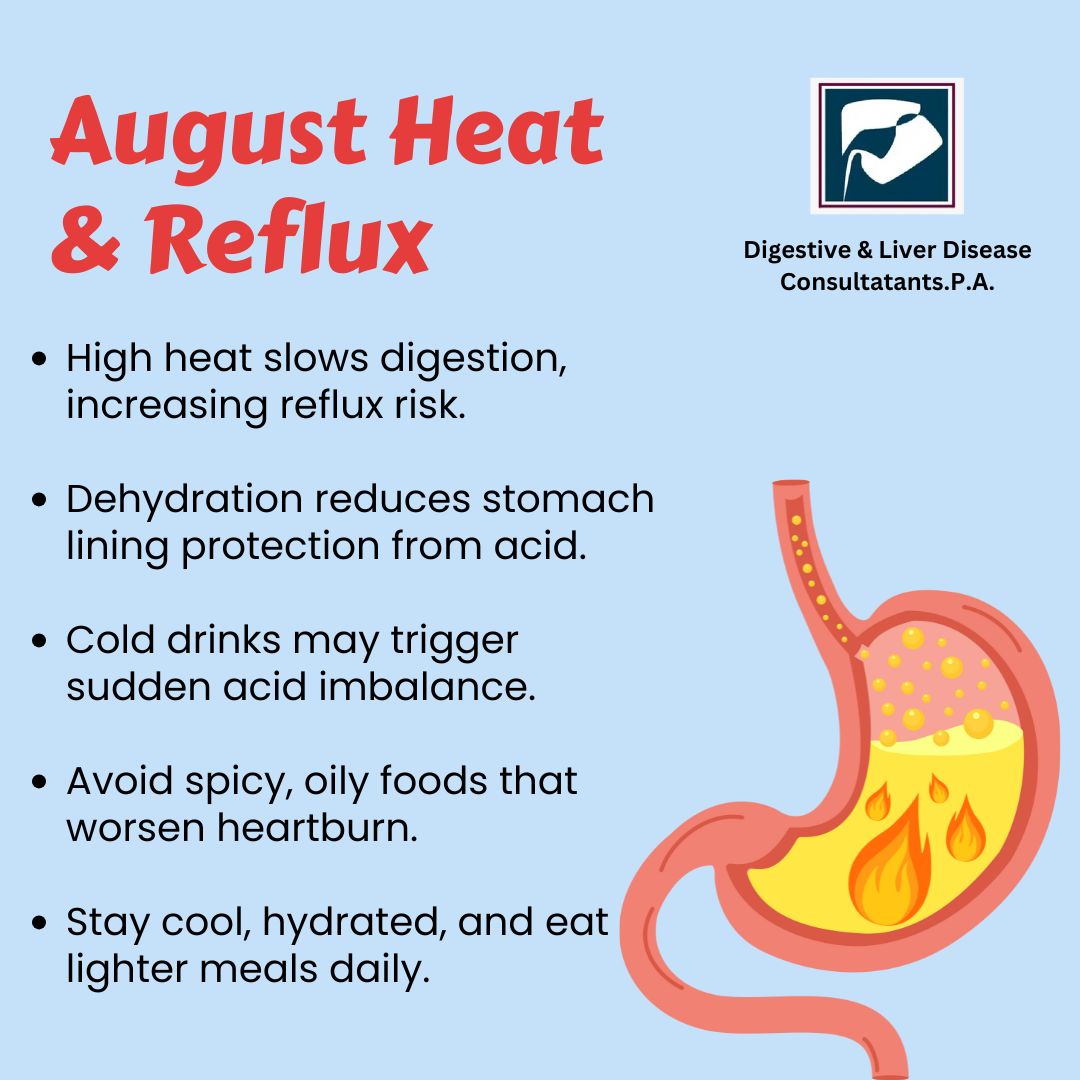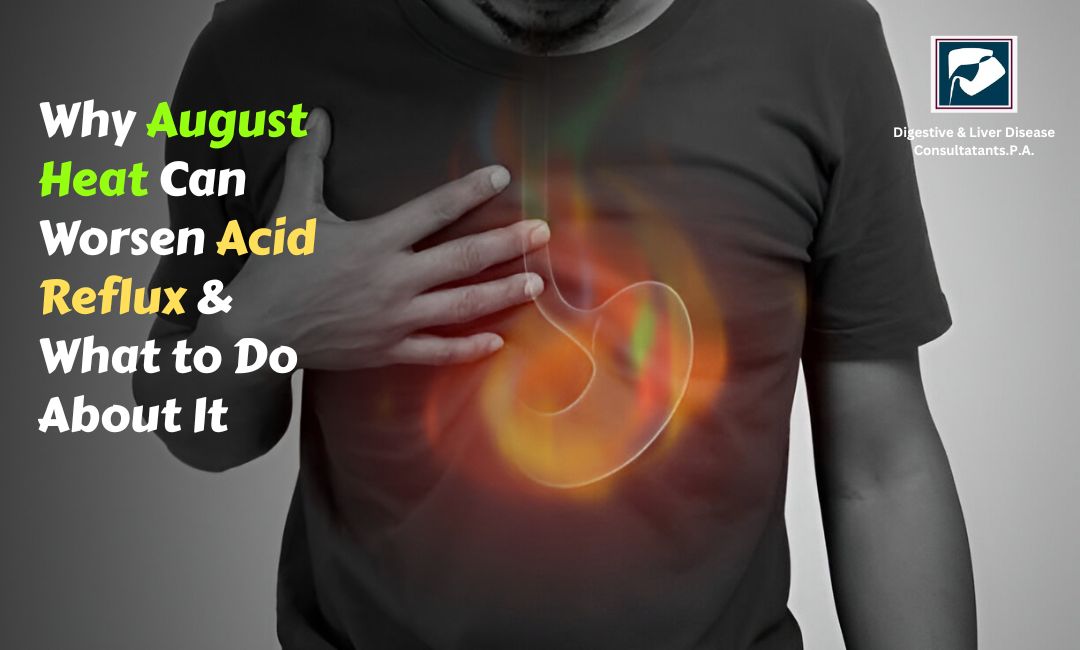As the summer heat peaks in August, many people notice a sudden flare-up in their acid reflux symptoms. That burning sensation in your chest, the bitter taste in your mouth, and the discomfort after meals can all become more frequent and intense during hot weather. But why does this happen? And more importantly, what can you do to find relief?
In this blog, we’ll explore the surprising link between extreme heat and acid reflux and share practical tips to manage your symptoms all summer long.
What Is Acid Reflux?
Acid reflux happens when stomach acid flows back into the oesophagus, the tube that connects your mouth to your stomach. This backward flow is called gastroesophageal reflux. Occasional reflux is common, but when it becomes frequent and disruptive, it may be diagnosed as GERD (Gastroesophageal Reflux Disease).
Common symptoms include:
- Heartburn
- Regurgitation
- Chest pain
- Difficulty swallowing
- A feeling of a lump in your throat
While food and lifestyle habits play a big role in acid reflux, many people are unaware that seasonal changes — especially the hot and humid weather of August — can also make symptoms worse.

How August Heat Triggers Acid Reflux
Let’s take a closer look at how the August heat can affect your digestive system and increase the chances of acid reflux:
1. Dehydration Slows Digestion
High temperatures mean more sweating, which leads to fluid loss. When you’re dehydrated, your digestive system slows down. This delay in digestion can cause food and stomach acid to stay longer in your stomach, increasing the risk of reflux.
2. More Cold Drinks and Iced Caffeine
During summer, people often reach for iced coffees, sodas, or chilled alcoholic beverages to cool off. Unfortunately, caffeine, carbonation, and alcohol are all known acid reflux triggers.
3. Heavier Meals and BBQ Foods
Summer cookouts, spicy grilled meats, and fatty foods can all irritate your stomach lining and relax the lower esophageal sphincter (LES) — the muscle that keeps stomach acid from rising.
4. Sleeping Later and Eating Later
With longer days and vacation mode in full swing, it’s common to eat late dinners and go to bed soon after. Lying down too soon after eating increases the chances of acid backing up into the esophagus.
5. Increased Stress Levels
Ironically, summer can also bring stress — whether it's travel anxiety, juggling kids during school breaks, or heat-induced irritability. Stress can increase stomach acid production and make your digestive system more sensitive.
How to Protect Yourself from Acid Reflux in Hot Weather
You don’t have to let acid reflux ruin your summer. A few mindful changes can make a big difference. Here’s what you can do:
1. Stay Hydrated
Drink plenty of water throughout the day to help your body function well and promote smoother digestion. Aim for at least 8–10 glasses daily.
2. Limit Reflux Triggers
Reduce your intake of:
- Caffeinated drinks like iced coffee or tea
- Carbonated beverages
- Spicy and greasy foods
- Chocolate and mint
- Citrus fruits and juices
Instead, opt for:
- Cooling herbal teas like chamomile
- Watermelon and cucumber
- Oatmeal, whole grains, and grilled vegetables
3. Eat Lighter Meals More Often
Rather than having large, heavy meals, go for smaller portions spaced throughout the day. This puts less pressure on your stomach and reduces the chance of reflux.
4. Don’t Lie Down Right After Eating
Wait at least 2–3 hours after meals before lying down or going to bed. This gives your stomach time to empty and reduces the chances of acid flowing back up.
5. Sleep with Your Head Elevated
If nighttime reflux is a problem, elevate the head of your bed by 6–8 inches or use a wedge pillow. This positioning helps gravity keep acid down.
6. Manage Your Stress
Practice stress-reducing activities like deep breathing, yoga, walking in the early morning or evening, or listening to calming music. A calm mind supports a calm gut.
7. Wear Loose Clothing
Tight belts or clothing can squeeze your abdomen and push stomach contents up. Choose loose, breathable outfits in the summer to stay cool and reflux-free.
When to See a Digestive Specialist
If you’re experiencing persistent acid reflux, especially during the summer months, it’s time to get professional help. Left untreated, acid reflux can lead to complications such as esophagitis, ulcers, or even esophageal cancer in severe cases.
At Digestive & Liver Disease Consultants, P.A., we specialize in diagnosing and treating acid reflux and other digestive disorders. Our board-certified gastroenterologists use advanced diagnostic tools to identify the root cause of your symptoms and create a personalized treatment plan that works for you.
Whether you need lifestyle guidance, medications, or a more advanced intervention, our team is here to help you enjoy life without digestive discomfort.
About Digestive & Liver Disease Consultants, P.A.
Digestive & Liver Disease Consultants, P.A. is a leading gastroenterology clinic based in Texas. With a strong commitment to patient care, we provide state-of-the-art services for a wide range of digestive and liver conditions, including acid reflux, GERD, IBS, liver disease, colon cancer screening, and more.
Our experienced team of physicians focuses on patient-centred care, ensuring that each individual receives attention, education, and support throughout their treatment journey.
Final Thoughts
August heat may be unavoidable, but acid reflux doesn’t have to be. By making small, smart choices and staying aware of your triggers, you can keep reflux at bay and enjoy a more comfortable summer.
If you suffer from frequent acid reflux, heartburn, or indigestion, schedule a consultation with our best gastroenterology experts at Digestive & Liver Disease Consultants, P.A. today. Relief is just one appointment away.






